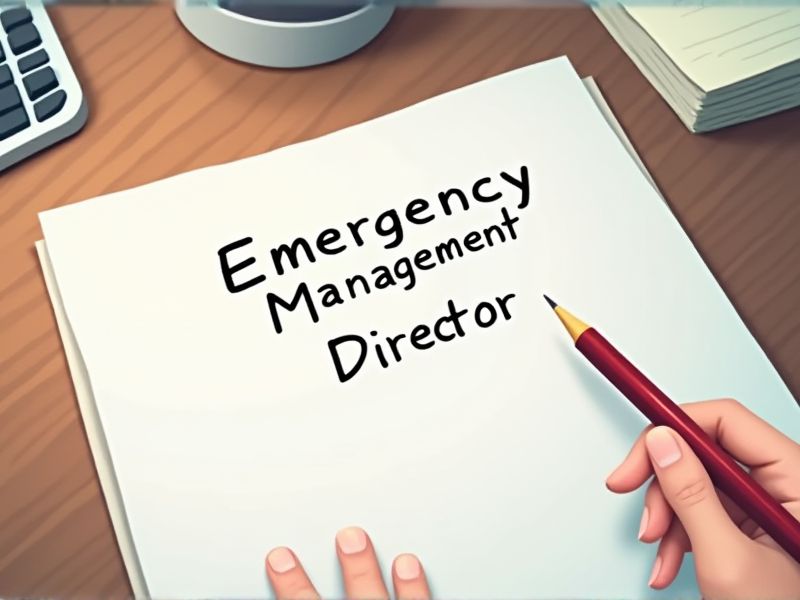
An Emergency Management Director orchestrates preparedness, response, and recovery plans during crises, necessitating a deep understanding of risk assessment and mitigation strategies. Certifications in this field confirm expertise in areas such as disaster response, communication, and resource management. Such credentials ensure that directors can effectively lead teams and collaborate with multiple agencies. Here are some important certifications you may need as an Emergency Management Director.
Certified Emergency Manager (CEM)
A Certified Emergency Manager provides standardized validation of expertise, which helps in effectively coordinating emergency responses. Their certification ensures adherence to best practices and continuous education, thereby enhancing preparedness and resilience. This designation instills public and stakeholder confidence in an Emergency Management Director's capabilities. Holding a CEM credential often leads to better resource management and strategic decision-making during crises.
Associate Emergency Manager (AEM)
The role of an Associate Emergency Manager (AEM) provides essential support to the Emergency Management Director by handling operational aspects, allowing the director to focus on strategic planning. AEMs facilitate effective communication and coordination among multiple agencies, which streamlines emergency response efforts. Their expertise in data analysis and risk assessment aids in identifying potential hazards and developing mitigation strategies. AEM involvement ensures that emergency protocols are consistently updated and adhered to, improving overall preparedness and response efficiency.
Certified Business Continuity Professional (CBCP)
Certified Business Continuity Professionals possess comprehensive knowledge in risk assessment, which is crucial for identifying vulnerabilities in emergency management. Their expertise ensures effective continuity planning, minimizing operational disruptions during crises. CBCPs offer specialized skills in coordinating cross-functional teams, enhancing communication among departments during emergencies. Their certification signifies commitment to best practices, increasing stakeholder confidence in the director's ability to manage unexpected events.
FEMA ICS-300 Certification
FEMA ICS-300 Certification is crucial for an Emergency Management Director as it provides essential knowledge about the Incident Command System (ICS), enabling them to effectively manage incidents of varying sizes and complexities. The certification ensures that directors can coordinate interagency responses, enhancing operational efficiency during emergencies. It also equips them with skills to establish communication protocols, essential for maintaining situational awareness and resource allocation. Without this certification, directors may lack the structured framework necessary for coordinating and supporting multi-agency operations effectively.
FEMA ICS-400 Certification
FEMA ICS-400 Certification is essential for an Emergency Management Director because it ensures advanced competency in managing complex incidents. The training provides critical skills for coordinating resources and personnel during emergencies predominantly involving multiple jurisdictions or agencies. This certification enhances decision-making in high-stress environments, crucial for avoiding costly delays and miscommunications. Possessing this credential demonstrates a commitment to upholding national standards, facilitating improved collaboration with other emergency management professionals.
National Incident Management System (NIMS) Certification
NIMS Certification ensures an Emergency Management Director can effectively coordinate resources and responses during disasters, as it establishes a standardized approach to incident management. Possession of this certification signifies that the director is knowledgeable in integrating various emergency response efforts across different agencies and jurisdictions. The training associated with NIMS provides the necessary skills to create a unified command structure, thereby enhancing operational efficiency. A director with NIMS Certification predicates their capability to maintain clear communication and collaboration among first responders, which can directly impact the success of emergency operations.
Certified Risk Management Professional (CRMP)
Emergency Management Directors utilize CRMP certification for a specialized understanding of risk assessment methodologies that enhance community resilience. The certification equips them with a structured framework to analyze potential threats and develop effective mitigation strategies. By possessing CRMP credentials, directors gain credibility and authority, facilitating better coordination with stakeholders. The structured training and principles embedded in the CRMP process foster informed decision-making, crucial for managing crises efficiently.
Certified Homeland Security Professional (CHSP)
Emerging threats and complex security challenges require Homeland Security expertise, underscoring the need for Certified Homeland Security Professionals (CHSPs) in the role of an Emergency Management Director. The CHSP credential ensures proficiency in risk assessment, critical for identifying potential hazards and devising effective mitigation strategies. An Emergency Management Director with CHSP certification has enhanced skills in coordinating multi-agency responses, improving overall disaster response efficiencies. Increased public trust and credibility in the role arise from the comprehensive training and knowledge that CHSP certification provides.
Public Information Officer (PIO) Certification
Certification for Public Information Officers (PIOs) enhances the credibility and trustworthiness of communication during crises. Training ensures PIOs are equipped with skills to disseminate accurate and timely information, reducing misinformation. Certification provides standardized approaches, improving coordination between agencies and stakeholders. Emergency Management Directors benefit from certified PIOs as it enhances overall emergency response effectiveness and public confidence.
Certified Protection Professional (CPP)
Having a Certified Protection Professional (CPP) designation equips an Emergency Management Director with advanced knowledge in security management, enhancing their ability to foresee and mitigate potential threats. The CPP credential demonstrates a commitment to industry standards, fostering trust among stakeholders during crisis situations. With comprehensive training in risk assessment, a CPP-certified director effectively prioritizes resources and response actions. This certification also aids in ensuring compliance with legal and regulatory requirements, reducing potential liabilities during emergencies.
Summary
As you pursue certifications in emergency management, you can expect enhanced skills and knowledge, leading to more effective decision-making during crises. This credentialing often improves credibility and leadership capabilities, fostering trust among team members and the community. With specialized training, your ability to coordinate multi-agency responses strengthens, ensuring swift and efficient emergency operations. The community benefits from improved disaster preparedness and resilience, reducing potential impacts of future emergencies.
